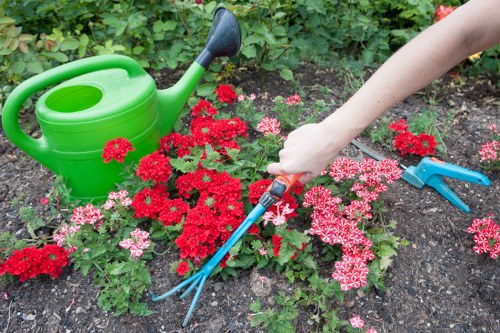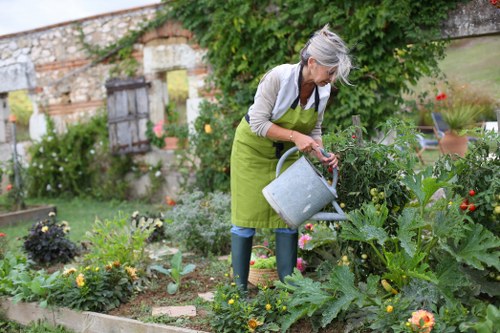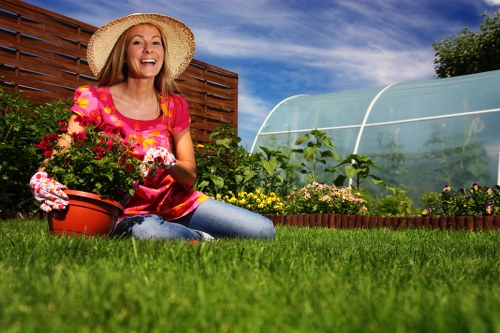Comprehensive Guide to Garden Maintenance in Rotherhithe

Maintaining a beautiful garden in Rotherhithe requires a blend of passion, knowledge, and the right techniques. Whether you’re a seasoned gardener or a beginner, understanding the specific needs of your garden in this unique London borough can transform your outdoor space into a thriving oasis.
Rotherhithe, with its rich history and riverside charm, offers a distinctive environment for gardening. The area's climate, soil type, and urban setting present both challenges and opportunities for garden enthusiasts. This guide aims to provide you with essential tips and strategies to ensure your garden remains healthy and vibrant throughout the year.
From seasonal planting schedules to effective pest control, we cover all aspects of garden maintenance tailored to Rotherhithe's specific conditions. Our goal is to help you create a sustainable and aesthetically pleasing garden that complements the picturesque surroundings of this historic area.
Understanding Rotherhithe’s Climate

Rotherhithe experiences a temperate maritime climate, characterized by mild winters and cool summers. Understanding the local climate is crucial for planning your garden maintenance schedule.
The average temperatures in Rotherhithe range from 2°C in winter to 22°C in summer. Rainfall is fairly evenly distributed throughout the year, but late spring and early autumn can be particularly wet, which affects planting and soil health.
Key Climate Considerations:
- Temperature: Plan plant selection based on temperature resilience.
- Rainfall: Ensure proper drainage to prevent waterlogging.
- Sunlight: Most gardens receive varying levels of sunlight; arrange plants accordingly.
Soil Preparation and Health

The foundation of any successful garden is healthy soil. Rotherhithe’s soil composition can vary, so conducting a soil test is recommended to determine its pH and nutrient levels.
Steps to Improve Soil Health:
- Conduct a soil test to assess pH and nutrient levels.
- Amend the soil with organic matter such as compost or well-rotted manure.
- Ensure proper drainage to prevent root diseases.
- Rotate crops annually to maintain soil fertility.
Maintaining soil health not only supports plant growth but also enhances the overall resilience of your garden against pests and diseases.
Seasonal Planting Schedules

Adhering to a seasonal planting schedule ensures that your garden remains productive and visually appealing throughout the year.
Spring
Spring is the perfect time to plant a variety of annuals, vegetables, and shrubs. Focus on species that thrive in cooler temperatures and utilize the increased daylight to encourage growth.
Summer
During summer, prioritize heat-tolerant plants and implement effective watering strategies to combat the warmer weather. Incorporating shade-tolerant plants can also help maintain garden health.
Autumn
Autumn is ideal for planting perennials and preparing your garden for the winter months. Mulching and soil enrichment are essential practices during this season.
Winter
Winter maintenance includes protecting plants from frost, pruning dormant trees, and planning for the upcoming planting season. Utilizing cover crops can also benefit soil health.
Effective Irrigation Techniques

Proper irrigation is critical for maintaining a healthy garden, especially in areas like Rotherhithe where rainfall can be unpredictable.
Implementing a combination of watering methods can optimize water usage and promote plant health:
- Drip Irrigation: Delivers water directly to the plant roots, reducing evaporation and waste.
- Rain Barrels: Collects and stores rainwater for use during dry periods.
- Soaker Hoses: Provide consistent moisture to garden beds without overwatering.
Additionally, incorporating mulch can help retain soil moisture, regulate temperature, and reduce weed growth, further enhancing your garden's resilience.
Pest and Disease Management
Maintaining a pest-free garden is essential for the health and aesthetics of your plants. In Rotherhithe, common pests include aphids, slugs, and caterpillars.
Strategies for Effective Pest Control:
- Introduce natural predators like ladybugs to control aphid populations.
- Use organic slug traps to manage slug infestations.
- Implement barriers and traps for caterpillars to protect your plants.
- Apply neem oil or other organic pesticides as necessary.
Regularly inspecting your plants and maintaining good garden hygiene can prevent pest and disease outbreaks, ensuring a thriving garden environment.
Pruning and Trimming Techniques
Regular pruning and trimming are vital for the health and shape of your plants. Proper techniques promote growth, remove dead or diseased branches, and enhance the overall appearance of your garden.
When to Prune
Different plants require pruning at specific times of the year. Generally, late winter or early spring is ideal for most shrubs and trees, while summer pruning can help manage growth and shape.
Pruning Tools
Using the right tools is essential for effective pruning:
- Hand Pruners: Suitable for small branches and precise cuts.
- Pruning Saws: Ideal for larger branches that require more force.
- Loppers: Perfect for thick stems that are difficult to cut with hand pruners.
Maintaining your tools by cleaning and sharpening them regularly ensures clean cuts and minimizes damage to your plants.
Weed Control Methods
Weeds compete with your desired plants for nutrients, water, and sunlight. Effective weed control is essential for maintaining a healthy garden.
Natural Weed Control:
- Mulching: Applying a layer of mulch suppresses weed growth and retains soil moisture.
- Hand Weeding: Regularly removing weeds by hand prevents them from taking hold.
- Cover Crops: Planting cover crops can outcompete weeds and improve soil health.
Avoiding chemical herbicides is recommended to maintain an eco-friendly garden and protect beneficial insects and soil microorganisms.
Composting and Soil Enrichment
Composting is an environmentally friendly way to recycle garden waste and enrich your soil. Creating a compost pile in Rotherhithe can provide you with a steady supply of nutrient-rich compost for your garden.
Benefits of Composting:
- Reduces household waste by recycling organic materials.
- Improves soil structure and fertility.
- Enhances moisture retention in the soil.
- Encourages beneficial microbial activity.
To start composting, gather kitchen scraps, garden waste, and other organic materials. Maintain a balanced mix of green (nitrogen-rich) and brown (carbon-rich) materials, and turn the pile regularly to promote decomposition.
Choosing the Right Plants for Rotherhithe Gardens
Selecting plants that thrive in Rotherhithe’s climate and soil conditions is crucial for a successful garden. Consider the following categories when choosing your plants:
Perennials
Perennials return year after year, providing consistent beauty and reducing the need for replanting. Popular choices include lavender, hostas, and daylilies.
Annuals
Annuals offer vibrant colors and can be changed each season to keep your garden fresh. Consider marigolds, petunias, and zinnias for seasonal interest.
Vegetables and Herbs
Growing your own vegetables and herbs not only supplies fresh produce but also adds functionality to your garden. Tomatoes, basil, and lettuce are excellent choices for Rotherhithe gardens.
Shrubs and Trees
Shrubs and trees provide structure and shade to your garden. Consider boxwood, hydrangeas, and ornamental fruit trees to enhance your garden’s landscape.
Maintaining Garden Tools
Proper maintenance of garden tools extends their lifespan and ensures they perform effectively. Regularly cleaning, sharpening, and storing your tools correctly can prevent rust and damage.
Tool Maintenance Tips:
- Clean tools after each use to remove dirt and debris.
- Sharpen blades regularly to maintain cutting efficiency.
- Apply oil to metal parts to prevent rust.
- Store tools in a dry, sheltered area to avoid weather damage.
Investing time in tool maintenance not only preserves your equipment but also makes your gardening tasks easier and more enjoyable.
Sustainable Gardening Practices
Adopting sustainable gardening practices benefits both your garden and the environment. Sustainable methods promote biodiversity, conserve resources, and reduce pollution.
Key Sustainable Practices:
- Water Conservation: Utilize efficient irrigation systems and rainwater harvesting to minimize water usage.
- Organic Gardening: Avoid synthetic fertilizers and pesticides, opting for natural alternatives instead.
- Native Plants: Choose native species that are well-adapted to the local climate and support local wildlife.
- Composting: Recycle organic waste and enrich your soil naturally.
Implementing these practices not only enhances your garden’s health but also contributes to a more sustainable and eco-friendly community in Rotherhithe.
Lawn Care and Maintenance
A well-maintained lawn serves as the centerpiece of your garden. Proper lawn care involves mowing, fertilizing, and addressing common lawn issues.
Mowing Tips
Mow your lawn regularly, keeping the grass at an optimal height of 2.5 to 3 inches. This encourages deeper root growth and reduces weed proliferation.
Fertilizing
Apply a balanced fertilizer in the spring and autumn to provide essential nutrients. Avoid over-fertilizing, which can lead to excessive growth and susceptibility to disease.
Weed and Pest Control
Monitor your lawn for signs of weeds and pests. Use targeted treatments to address specific issues without harming beneficial organisms.
Watering Practices
Deep, infrequent watering promotes strong root systems. Water early in the morning to minimize evaporation and reduce the risk of fungal diseases.
Hardscape Maintenance
Hardscape elements, such as pathways, patios, and fences, play a significant role in the overall aesthetics of your garden. Regular maintenance ensures these features remain functional and attractive.
Pathways and Patios
Keep pathways and patios clean by removing debris and weeds. Repair any cracks or uneven surfaces to prevent tripping hazards and maintain structural integrity.
Fences and Gates
Inspect fences and gates regularly for signs of wear or damage. Repaint or treat wood and metal surfaces to protect against the elements and extend their lifespan.
Garden Lighting
Maintain garden lighting by cleaning fixtures and replacing bulbs as needed. Proper lighting enhances the beauty of your garden at night and improves safety.
Creating a Wildlife-Friendly Garden
Encouraging wildlife in your garden enhances biodiversity and contributes to a balanced ecosystem. A wildlife-friendly garden attracts beneficial insects, birds, and other creatures.
Habitat Creation
Provide habitats for wildlife by incorporating features such as birdhouses, insect hotels, and water sources like birdbaths or small ponds.
Plant Selection
Choose a variety of plants that offer nectar, seeds, and shelter. Native flowers, shrubs, and trees support local fauna and promote ecological balance.
Pesticide-Free Practices
Minimize or eliminate the use of pesticides to protect beneficial insects and maintain a healthy environment for wildlife.
Natural Predators
Encourage the presence of natural predators, such as birds and ladybugs, to keep pest populations in check without chemical intervention.
Seasonal Garden Maintenance Checklist
Following a seasonal maintenance checklist ensures that your garden remains in optimal condition throughout the year.
Spring Checklist
- Clean and prepare garden beds.
- Plant new annuals and perennials.
- Prune shrubs and trees.
- Set up irrigation systems.
Summer Checklist
- Monitor and adjust watering schedules.
- Manage pests and weeds.
- Harvest vegetables and herbs.
- Maintain garden tools.
Autumn Checklist
- Rake fallen leaves and compost.
- Plant cover crops.
- Mulch garden beds.
- Prepare plants for winter.
Winter Checklist
- Protect plants from frost.
- Prune dormant trees.
- Plan for the next planting season.
- Store garden tools properly.
Hiring Professional Garden Maintenance Services
While DIY garden maintenance is rewarding, hiring professional services can provide expertise and save time. Professional gardeners in Rotherhithe understand the local climate and soil conditions, offering tailored solutions for your garden.
Benefits of Professional Services:
- Expert knowledge of plant care and garden design.
- Access to specialized tools and equipment.
- Time-saving for busy homeowners.
- Consistent and reliable maintenance schedules.
If you’re looking to elevate your garden’s appearance and health without the hassle, consider contacting a local garden maintenance professional in Rotherhithe.
Eco-Friendly Garden Maintenance Tips
Embracing eco-friendly practices in your garden not only benefits the environment but also creates a healthier space for you and your family.
Top Eco-Friendly Tips:
- Use organic fertilizers to enrich the soil naturally.
- Implement rainwater harvesting to conserve water.
- Choose native and drought-resistant plants.
- Reduce waste by composting garden debris.
- Encourage biodiversity by planting a variety of species.
Incorporating these practices into your garden maintenance routine can lead to a sustainable and thriving garden that supports local ecosystems.
Leveraging Technology for Garden Maintenance
Modern technology offers various tools and applications to enhance garden maintenance efficiency and effectiveness.
Smart Irrigation Systems
Smart irrigation systems automatically adjust watering schedules based on weather conditions and soil moisture levels, ensuring optimal water usage and plant health.
Garden Planning Apps
Utilize garden planning apps to design layouts, schedule planting, and track maintenance tasks. These tools help organize your gardening activities and monitor progress.
Pest Monitoring Devices
Advanced pest monitoring devices can detect and identify pest activity early, enabling prompt and targeted interventions.
Weather Forecasting Tools
Stay informed about local weather conditions with reliable forecasting tools, allowing you to plan outdoor gardening activities accordingly.
Community and Resources in Rotherhithe
Engaging with the local gardening community in Rotherhithe can provide valuable support, knowledge, and inspiration for your garden maintenance journey.
Local Resources:
- Join local gardening clubs and groups to share experiences and tips.
- Attend workshops and seminars hosted by community gardens and nurseries.
- Access gardening resources and guides at local libraries and community centers.
- Participate in community garden projects to gain hands-on experience.
Connecting with fellow gardeners fosters a sense of community and provides opportunities to learn from others who share your passion for maintaining beautiful gardens in Rotherhithe.
Final Thoughts on Garden Maintenance in Rotherhithe
Maintaining a garden in Rotherhithe is a fulfilling endeavor that combines creativity, sustainability, and community engagement. By understanding the local climate, preparing your soil, choosing the right plants, and implementing effective maintenance practices, you can create a garden that not only thrives but also enhances the beauty of your surroundings.
Whether you opt for DIY maintenance or enlist professional services, the key is consistency and attention to detail. Embrace the unique challenges and opportunities that Rotherhithe offers, and watch your garden flourish.
Ready to transform your garden? Contact us today to learn more about our specialized garden maintenance services in Rotherhithe and embark on your journey to a stunning outdoor space.
